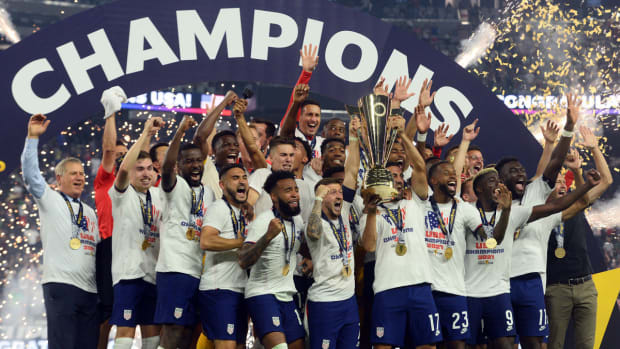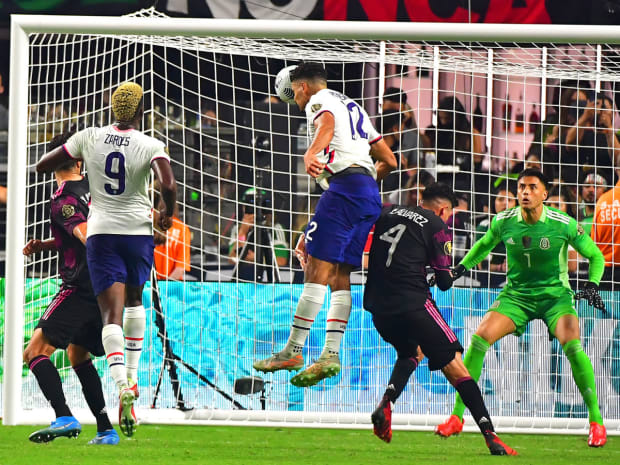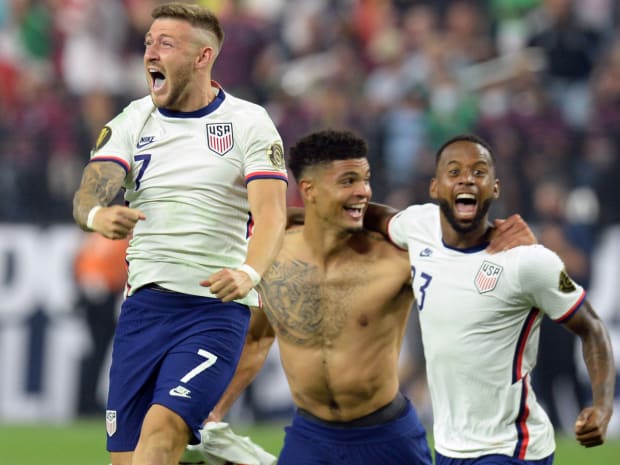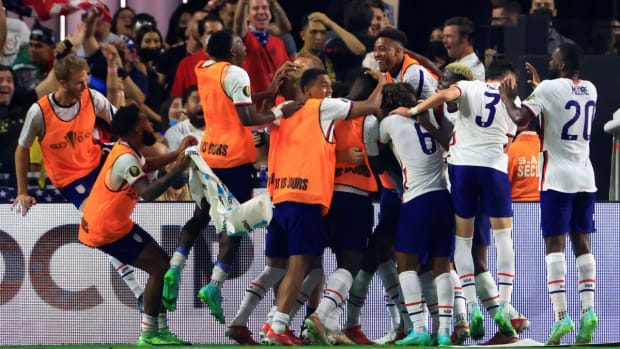A largely inexperienced group did what its more accomplished colleagues did months prior: outlast Mexico in a final while building toward something bigger.
Win or lose, gold or silver—whatever the eventual outcome—what a young, inexperienced and unfancied U.S. men's national team accomplished during this summer’s Concacaf Gold Cup already ranked as one of the program’s most impressive modern-era achievements.
The number of young American men now contributing and winning at the sport’s top clubs, and their triumphant showing at June’s regional Nations League final four, is one sign that the U.S. is entering a new era. The commitment, learning curve and resolve demonstrated by the player pool’s second tier throughout the Gold Cup, and then during Sunday’s gripping final against rival Mexico, is yet another.
U.S. coach Gregg Berhalter opted to rest his top talent and test American depth at this continental championship. It seemed like a counterintuitive choice, but the reasons were valid. The 16th Gold Cup was being played late in the summer. Rest and preseason are important to top players, and World Cup qualifying is around the corner.
Still, there weren’t many preemptive excuses offered, despite the MLS-heavy squad’s reduced star power. Expectations within the program have risen. They would play to win, Berhalter promised. And so the coach’s players embraced their opportunity and rewarded his faith, competing with maturity, composure and confidence and, in the end, delivering a 1–0 extra-time win over El Tri and a stunning and historic title.

“I’m so excited for them, so proud of them. We really wanted it badly for this group,” Berhalter said following the triumph. “I can’t say enough about their spirit, their hard work, their dedication. It was a great month for them.”
The young Americans had been a smashing success even before the trophy was secured. But to clinch it over a loaded Mexican side, before a very pro-Mexican crowd at sold-out Allegiant Stadium in Las Vegas, sent a clear, resounding and unforgettable signal. The pendulum is swinging back north.
Arguably the revelation of the tournament, Atlanta United center back Miles Robinson scored the final’s only goal in the 117th minute, heading home a bending free kick from midfielder Kellyn Acosta. Robinson had been denied the opportunity to play for the U.S. during this spring’s Olympic qualifiers, where an undermanned U-24 side struggled and fell short. He’s clearly beyond that level. The 24-year-old started all six Gold Cup games, was outstanding as a stalwart one-on-one and emergency defender and scored twice.
Set pieces made the difference in June’s Nations League final, and they did so again on Sunday. Finals are tight. Details often define them.
“We were focusing a lot on set pieces,” Robinson said moments after the final whistle. “I knew if I could get open, get a half step, I could finish one. Kellyn put a perfect ball in so I had to finish it.”

This Concacaf championship was the seventh for the U.S., and it came after the Americans beat Mexico in a Gold Cup final for just the second time in seven tries. El Tri won the 2019 edition in Chicago by the same 1–0 score. Berhalter & Co. earned some unexpected revenge on Sunday.
The Americans went 6-0-0 at the Gold Cup, yielded just one goal (on a penalty kick, no less) and won five games by a 1–0 score. That’s veteran tournament play by a team that set all types of youth-related milestones. The starting lineups in the quarterfinal win over Jamaica and semifinal defeat of guest team and Asian champion Qatar were the second and third-youngest XIs ever deployed by a U.S. coach in a knockout-round game. Twelve American men made their first competitive appearance during the Gold Cup, and five made their international debuts. The trio of Robinson, goalkeeper Matt Turner and defender James Sands, who were so brilliant in the back, had earned a combined four caps before the Gold Cup kicked off.
Berhalter had hoped to unearth some players who had the mettle to assist in the upcoming World Cup qualifying octagonal. Winning the Gold Cup would represent gilded icing on the cake. He got both, and Sunday was his 48th birthday. In addition to the aforementioned trio, the likes of forward Matthew Hoppe, right back Shaq Moore, forward Nicholas Gioacchini, midfielder Gianluca Busio and midfielder Eryk Williamson made good impressions. Veterans like Acosta, Gyasi Zardes and Cristian Roldan also made their mark. It wasn’t just the technical and tactical that impressed Berhalter, however. World Cup qualifying can expose intangible flaws, and the manager said before the final that this current group had the potential to pass those tests.
"The only thing that has exceeded our expectations has been the mentality of the group,” he said. “You never know exactly how the group is going to come together when you name the roster. I’ve been absolutely amazed at the cohesiveness of this group, how players are responding to challenges and how the team is so focused on our goals.”

The “next man up” approach he has referenced and used throughout the competition continued into Sunday’s final, as he replaced four starters from the first XI that defeated Jamaica and Qatar. Or, more accurately, the first XI that set up Jamaica and Qatar to be defeated. The key in both those games, like the tournament itself, was resilience, reinforcements and remaining hard to beat. The starters survived and wore the opponent down, and then the cavalry charged off the bench to help find the clincher. While the quarter and semi were won in the final 10 minutes, it took extra time to decide the final.
Turner was crucial to keeping Sunday’s game scoreless in regulation, denying Mexico’s Rogelio Funes Mori three times in the opening half. Mexico, which started seven men who were on the field at the beginning of the Nations League final, had more of the ball, as expected. But the Americans didn’t just sit deep and defend. They pressed, tackled and looked for turnovers and quick outlets. In fact, captain Paul Arriola should’ve put the U.S. ahead in the 28th minute, only to send a point-blank shot off the right post.
The first half was Mexico’s best. The final was frenetic and finely poised and featured some bad finishing, close calls and almost none of the controversy, violence or antics that tend to characterize the rivalry. Gradually, the match became more level, and around the 65th minute, Berhalter started to get some fresh legs on the field. The bend-but-don’t-break U.S. had weathered another storm, and Mexico seemed to be the team that was tiring. This had been the formula.

“For us, it’s about relentless pressing, it’s moving high and it’s next man up because we need fresh guys, we need fit guys, to be able to play the way we want to play,” Berhalter explained.
The U.S. had another couple good looks at goal via Arriola and the relentless Hoppe, and when Robinson finally clinched it, it hardly seemed undeserved. Arriola and Sebastian Lletget, two of Berhalter’s most trusted MLS men, shared the trophy-lifting honors at midfield.
“We have complete confidence in every man on this roster, and I think we demonstrated that by the starting lineup today,” Berhalter said. “So, really proud of the guys who came in. They did an excellent job. And again, it was about putting the team in position to win the game, and that’s what we did.”
That trophy-lifting pair, and many others who featured over the past month, almost certainly will be called upon again this fall and winter, when 12 of the 14 World Cup qualifiers will be contested during compact, three-game windows. It’ll be “next man up” again, and Berhalter now knows he has a much deeper pool of players to count on.
“Qualifying is everything right now. We’re focused on that right now,” he said moments after the final. “The player pool has matured and it’s been battle tested, and now we move on.”
More USMNT Coverage: